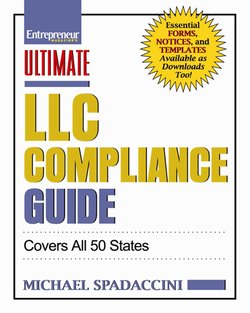Читать книгу Ultimate LLC Compliance Guide - Michael Spadaccini - Страница 38
На сайте Литреса книга снята с продажи.
FOREIGN LLCS
ОглавлениеAs mentioned earlier, an LLC conducting business in a state other than its state of organization is deemed a foreign LLC in the state in which it is a “guest.” States require foreign LLCs conducting business within their borders to register. This process of registering as a foreign LLC is known as qualification. What constitutes “conducting business” for the purposes of determining the qualification threshold differs from state to state, but universally states will define “conducting business” broadly.
But why do states require foreign LLCs to suffer the expensive and burdensome task of filing for qualification? There are several reasons.
First, foreign LLCs must pay for the privilege of doing business in a particular state. After all, an Oregon LLC competing for sales in California competes with California corporations and Californian LLCs—all of which have paid organizational fees in California. If out-of-state businesses were not required to qualify, they would enjoy a competitive advantage over domestic businesses. Thus, requiring all to register or qualify evens the playing field.
The second reason is for consumer protection. Once an LLC qualifies as a foreign LLC, it admits to jurisdiction in the foreign state, it appoints an agent for service of legal process, and it can be sued there. It is much easier to serve a company with legal process in one’s home state than in the state in which it was organized. Thus, consumers in the state where the LLC is qualified are more protected from any misdeeds committed by the LLC. Consequently, foreign LLCs are more accountable to consumers.
Qualifying as a foreign LLC closely mirrors the process of organization. LLCs must typically file their articles of organization in the foreign state, along with an additional filing that includes information specific to the foreign state, such as the resident agent in the foreign state. Every state’s procedure for foreign qualification will differ slightly. The filing fees for qualification are always at least as high as for filing articles of organization and often higher.
The decision whether to qualify in a foreign state must be made cautiously. Once qualified, an LLC must file periodic reports in the foreign state, will likely need to file tax returns and pay taxes there, and must appoint a local agent. Also, qualification in a foreign state makes it much easier for creditors to serve process and bring lawsuits against the LLC in the foreign state.
While the requirements of foreign qualification are clear and obvious, in practice such requirements are routinely ignored by smaller companies. Smaller companies simply lack the resources to register in each state in which they do business. Even though every state requires foreign LLCs to qualify, no state makes a meaningful effort to enforce its requirement. However, this is not to say that it is wise to ignore the obligation to qualify as a foreign LLC. The law is the law and you should always endeavor to obey it.
